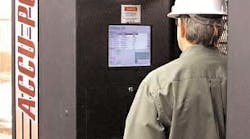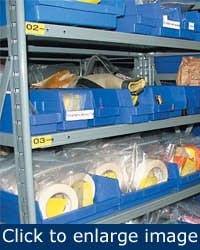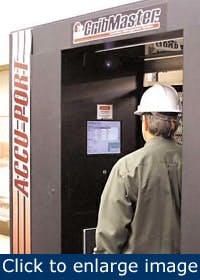A low-cost solution to provide what top customers need
For years, manufacturers have been leveraging the benefits of integrated supply programs with national suppliers of tooling, MRO and other indirect material. An integrated supply program shifts the resources needed from the end user to the supplier and allows the end user to focus on making product instead of maintaining inventory. Integrated supply allows manufacturers to focus on their core business while the integrator focuses on theirs. Additional manpower and safety stock become the responsibility of the integrator, which often leaves the small regional distributors out of luck.
When it comes to organizing tools and supply rooms, manufacturers often choose a common path to managing their indirect materials — outsource to an integrated supplier.
To maintain productivity, manufacturers need their supplies at their fingertips 24 hours a day and, at the same time, they desperately need a cost accounting solution to help them budget their materials. Many of these manufacturers have a close guide as to how much they are spending across the plant, but it is always challenging to track each expenditure by department. It is often difficult to capture the true cost of where usage is taking place. If they want to simply hand off this supply project and feel secure that their inventory can be readily available, they need a company that can provide this service reliably and affordably.
That's where Portland, Ore.-based supplier Bassett Industrial comes in. A true challenge for Bassett was to find a relatively low-cost solution that would provide the people, systems and supplies that their top customers demanded.
For a relatively small distributor like Bassett Industrial, supporting one of their largest clients required competent structure and thorough process mapping. Bassett weighed their options — the traditional bread man route, having a manned crib around the clock, cycle counting and hiring an on-site employee — but all of these solutions were costly.
The solution
After considering their options Bassett moved away from the manned cribs and cycle counting options. The time and effort associated with managing a bread man route made justification difficult for Bassett. According to Bassett VP John Lottis, "The additional costs associated with staffing would be impossible to justify for both Bassett and this particular customer." Instead, Bassett went ahead with another, pioneering idea. With the help of Marietta, Ga.-based WinWare, Bassett employed RFID to automate this multi-acre facility.
[pullquote]Bassett went ahead with the installation of the CribMaster Accu-Port, WinWare's RFID portal system. The Accu-Port offered a regulated solution for their tool room along with the cost-accounting system and material tracking capabilities of the CribMaster software. The Accu-Port is attached to the doorway of a store room where employees can simply walk in, grab their items and get back to work. Having access controls and a locked door (which will automatically open if the employee has permission to enter) still provides the facility with a secure tool crib, but also gives them tracking and auto-purchasing capabilities that allows their production facility to run smoothly and proficiently. As long as the items have an associated RFID tag, then each transaction will be recorded. The employees at the customer site took the ease of this process one step further by sticking their employee RFID badges in the top of their hard hats, which further automated the entry into the crib.
Before Bassett could 'go live' with the Accu-Port every item in the crib had to be assigned and affixed a RFID tag. Five thousand reprogrammable tags were purchased initially (none of which have been replaced to date) and the initial 'bag-n-tag' took about two days. Once the tag was assigned to the item it was either stuck to a durable product with its adhesive back, or consumable items were placed in laminated sleeves similar to a luggage tag.
Results
The results at Bassett's customer site were phenomenal. There was an immediate reduction in consumables as employees were grabbing items such as gloves by the pair instead of by the dozen. Another major cost reduction was with durable tools like grinders and drills. With CribMaster and the Accu-Port Bassett could see how many times an item had been used and repaired. This information made it easy to see not only when the product needed to be repaired, but also when it would be cheaper to replace it instead of mending it again.
Beyond the reduction in indirect product cost, Bassett's customer benefited from minimized soft costs. Productivity was maximized and time spent distributing supplies was diminished. Before RFID it was hard to tell how long it would be for a product to reach its destination for consumption but now that process has been reduced to virtually nothing. The internal distribution process has been enhanced now that product is simply carried through the gate and put on a shelf at the point of manufacturing.
All of these improvements led to an amazing return on investment on the Accu-Port, and Bassett's business with this global company has doubled. Both their customer and Bassett were finally able to utilize their employees' expertise appropriately by freeing up the man-hours surrounding the crib, and their supplies could be accessed 24/7. Comparing their budgeting capabilities from before and after RFID is practically impossible. Prior to implementing RFID with the Accu-Port, Bassett was incapable of capturing which departments were pulling what items from the cribs, but with CribMaster they can identify each expenditure to one of 25+ departments. Replenishment time was also economized with automation by reducing the twice weekly cycle counting to 24 hours a month, in turn, saving Bassett 43 man-hours each month with this integrated supply contract.
Continuous improvements
With the savings from just one Accu-Port, it was clear that implementing automation with RFID would expand to other areas of the facility. More recently, Bassett installed three more Accu-Ports at this customer's site to help organize their vast facility. John Lottis and Bassett have increased the durability of their tags by applying a layer of Tyvek, and they have brought the cost of these tags down by reusing them again and again with the 'bag-n-tag' technique. With time, Bassett has been able to optimize their customer's inventory levels by monitoring the usage and massaging the on-hand quantity regularly.
Bassett went from being a small supplier of a few products in a few departments at a global manufacturer's site to having corporate-wide visibility. Bassett Industrial feels that by implementing RFID with the CribMaster Accu-Port they have raised their creditability and expertise as a supplier. Lottis states, "RFID is the only efficient way to manage these products and that without automation this would have been impossible."


